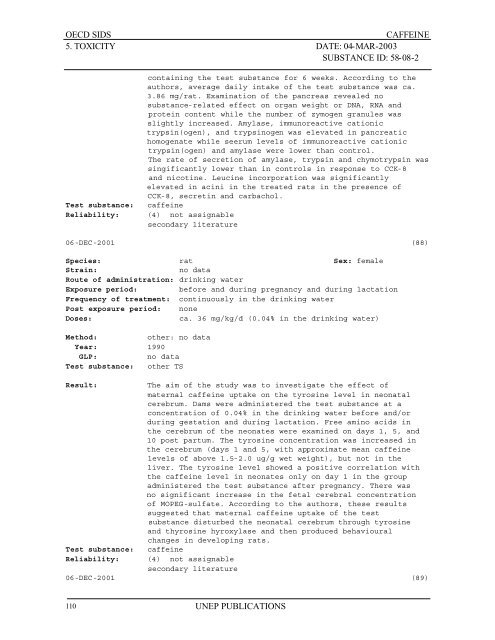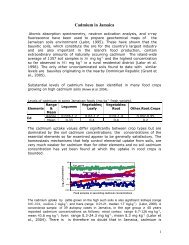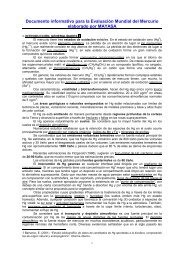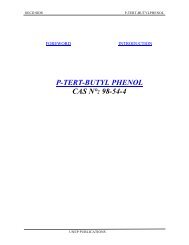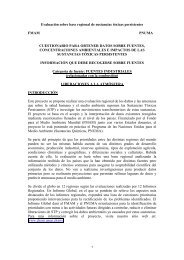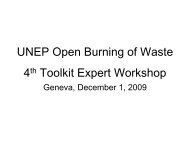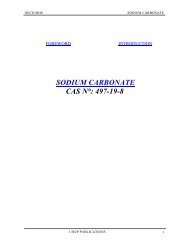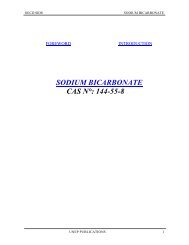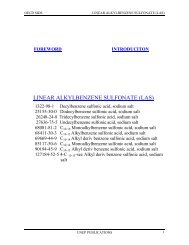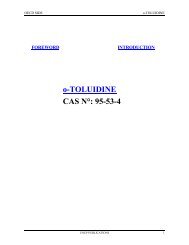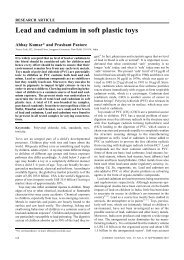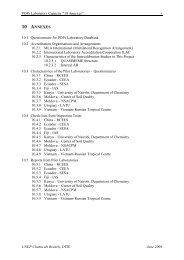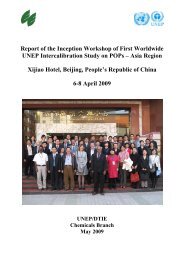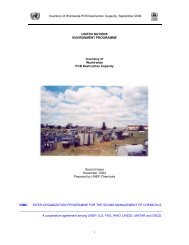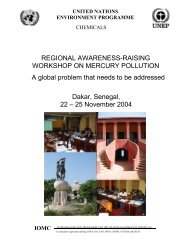- Page 1 and 2:
OECD SIDS CAFFEINE FOREWORD INTRODU
- Page 3 and 4:
OECD SIDS CAFFEINE lead company BAS
- Page 5 and 6:
OECD SIDS CAFFEINE Caffeine metabol
- Page 7 and 8:
OECD SIDS CAFFEINE FULL SIDS SUMMAR
- Page 9 and 10:
OECD SIDS CAFFEINE 5.9 Developmenta
- Page 11 and 12:
OECD SIDS CAFFEINE 1 IDENTITY SIDS
- Page 13 and 14:
OECD SIDS CAFFEINE Caffeine is prod
- Page 15 and 16:
OECD SIDS CAFFEINE The elimination
- Page 17 and 18:
OECD SIDS CAFFEINE Case reports and
- Page 19 and 20:
OECD SIDS CAFFEINE 3.1.1.5.2 Low bi
- Page 21 and 22:
OECD SIDS CAFFEINE Based on two coh
- Page 23 and 24:
OECD SIDS CAFFEINE No valid data av
- Page 25 and 26:
OECD SIDS CAFFEINE 3.1.6 Genetic To
- Page 27 and 28:
OECD SIDS CAFFEINE There were no st
- Page 29 and 30:
OECD SIDS CAFFEINE Task 3 (crossove
- Page 31 and 32:
OECD SIDS CAFFEINE 3.1.9 Developmen
- Page 33 and 34:
OECD SIDS CAFFEINE schedule) were r
- Page 35 and 36:
OECD SIDS CAFFEINE 5 Conclusions an
- Page 37 and 38:
OECD SIDS CAFFEINE Workplace: Takin
- Page 39 and 40:
OECD SIDS CAFFEINE (00/0360/21/1),
- Page 41 and 42:
OECD SIDS CAFFEINE Goldstein A., Wa
- Page 43 and 44:
OECD SIDS CAFFEINE Maihles J. B. et
- Page 45 and 46:
OECD SIDS CAFFEINE Rivenes S.M., et
- Page 47 and 48:
OECD SIDS CAFFEINE Date of the lite
- Page 49 and 50:
OECD SIDS CAFFEINE Existing Chemica
- Page 51 and 52:
OECD SIDS CAFFEINE 1. GENERAL INFOR
- Page 53 and 54:
OECD SIDS CAFFEINE 1. GENERAL INFOR
- Page 55 and 56:
OECD SIDS CAFFEINE 1. GENERAL INFOR
- Page 57 and 58:
OECD SIDS CAFFEINE 1. GENERAL INFOR
- Page 59 and 60: OECD SIDS CAFFEINE 1. GENERAL INFOR
- Page 61 and 62: OECD SIDS CAFFEINE 2. PHYSICO-CHEMI
- Page 63 and 64: OECD SIDS CAFFEINE 2. PHYSICO-CHEMI
- Page 65 and 66: OECD SIDS CAFFEINE 2. PHYSICO-CHEMI
- Page 67 and 68: OECD SIDS CAFFEINE 2. PHYSICO-CHEMI
- Page 69 and 70: OECD SIDS CAFFEINE 3. ENVIRONMENTAL
- Page 71 and 72: OECD SIDS CAFFEINE 3. ENVIRONMENTAL
- Page 73 and 74: OECD SIDS CAFFEINE 3. ENVIRONMENTAL
- Page 75 and 76: OECD SIDS CAFFEINE 3. ENVIRONMENTAL
- Page 77 and 78: OECD SIDS CAFFEINE 4. ECOTOXICITY D
- Page 79 and 80: OECD SIDS CAFFEINE 4. ECOTOXICITY D
- Page 81 and 82: OECD SIDS CAFFEINE 4. ECOTOXICITY D
- Page 83 and 84: OECD SIDS CAFFEINE 4. ECOTOXICITY D
- Page 85 and 86: OECD SIDS CAFFEINE 4. ECOTOXICITY D
- Page 87 and 88: OECD SIDS CAFFEINE 4. ECOTOXICITY D
- Page 89 and 90: OECD SIDS CAFFEINE 5. TOXICITY DATE
- Page 91 and 92: OECD SIDS CAFFEINE 5. TOXICITY DATE
- Page 93 and 94: OECD SIDS CAFFEINE 5. TOXICITY DATE
- Page 95 and 96: OECD SIDS CAFFEINE 5. TOXICITY DATE
- Page 97 and 98: OECD SIDS CAFFEINE 5. TOXICITY DATE
- Page 99 and 100: OECD SIDS CAFFEINE 5. TOXICITY DATE
- Page 101 and 102: OECD SIDS CAFFEINE 5. TOXICITY DATE
- Page 103 and 104: OECD SIDS CAFFEINE 5. TOXICITY DATE
- Page 105 and 106: OECD SIDS CAFFEINE 5. TOXICITY DATE
- Page 107 and 108: OECD SIDS CAFFEINE 5. TOXICITY DATE
- Page 109: OECD SIDS CAFFEINE 5. TOXICITY DATE
- Page 113 and 114: OECD SIDS CAFFEINE 5. TOXICITY DATE
- Page 115 and 116: OECD SIDS CAFFEINE 5. TOXICITY DATE
- Page 117 and 118: OECD SIDS CAFFEINE 5. TOXICITY DATE
- Page 119 and 120: OECD SIDS CAFFEINE 5. TOXICITY DATE
- Page 121 and 122: OECD SIDS CAFFEINE 5. TOXICITY DATE
- Page 123 and 124: OECD SIDS CAFFEINE 5. TOXICITY DATE
- Page 125 and 126: OECD SIDS CAFFEINE 5. TOXICITY DATE
- Page 127 and 128: OECD SIDS CAFFEINE 5. TOXICITY DATE
- Page 129 and 130: OECD SIDS CAFFEINE 5. TOXICITY DATE
- Page 131 and 132: OECD SIDS CAFFEINE 5. TOXICITY DATE
- Page 133 and 134: OECD SIDS CAFFEINE 5. TOXICITY DATE
- Page 135 and 136: OECD SIDS CAFFEINE 5. TOXICITY DATE
- Page 137 and 138: OECD SIDS CAFFEINE 5. TOXICITY DATE
- Page 139 and 140: OECD SIDS CAFFEINE 5. TOXICITY DATE
- Page 141 and 142: OECD SIDS CAFFEINE 5. TOXICITY DATE
- Page 143 and 144: OECD SIDS CAFFEINE 5. TOXICITY DATE
- Page 145 and 146: OECD SIDS CAFFEINE 5. TOXICITY DATE
- Page 147 and 148: OECD SIDS CAFFEINE 5. TOXICITY DATE
- Page 149 and 150: OECD SIDS CAFFEINE 5. TOXICITY DATE
- Page 151 and 152: OECD SIDS CAFFEINE 5. TOXICITY DATE
- Page 153 and 154: OECD SIDS CAFFEINE 5. TOXICITY DATE
- Page 155 and 156: OECD SIDS CAFFEINE 5. TOXICITY DATE
- Page 157 and 158: OECD SIDS CAFFEINE 5. TOXICITY DATE
- Page 159 and 160: OECD SIDS CAFFEINE 5. TOXICITY DATE
- Page 161 and 162:
OECD SIDS CAFFEINE 5. TOXICITY DATE
- Page 163 and 164:
OECD SIDS CAFFEINE 5. TOXICITY DATE
- Page 165 and 166:
OECD SIDS CAFFEINE 5. TOXICITY DATE
- Page 167 and 168:
OECD SIDS CAFFEINE 5. TOXICITY DATE
- Page 169 and 170:
OECD SIDS CAFFEINE 5. TOXICITY DATE
- Page 171 and 172:
OECD SIDS CAFFEINE 5. TOXICITY DATE
- Page 173 and 174:
OECD SIDS CAFFEINE 5. TOXICITY DATE
- Page 175 and 176:
OECD SIDS CAFFEINE 5. TOXICITY DATE
- Page 177 and 178:
OECD SIDS CAFFEINE 5. TOXICITY DATE
- Page 179 and 180:
OECD SIDS CAFFEINE 5. TOXICITY DATE
- Page 181 and 182:
OECD SIDS CAFFEINE 5. TOXICITY DATE
- Page 183 and 184:
OECD SIDS CAFFEINE 5. TOXICITY DATE
- Page 185 and 186:
OECD SIDS CAFFEINE 5. TOXICITY DATE
- Page 187 and 188:
OECD SIDS CAFFEINE 5. TOXICITY DATE
- Page 189 and 190:
OECD SIDS CAFFEINE 5. TOXICITY DATE
- Page 191 and 192:
OECD SIDS CAFFEINE 5. TOXICITY DATE
- Page 193 and 194:
OECD SIDS CAFFEINE 5. TOXICITY DATE
- Page 195 and 196:
OECD SIDS CAFFEINE 5. TOXICITY DATE
- Page 197 and 198:
OECD SIDS CAFFEINE 5. TOXICITY DATE
- Page 199 and 200:
OECD SIDS CAFFEINE 5. TOXICITY DATE
- Page 201 and 202:
OECD SIDS CAFFEINE 5. TOXICITY DATE
- Page 203 and 204:
OECD SIDS CAFFEINE 5. TOXICITY DATE
- Page 205 and 206:
OECD SIDS CAFFEINE 5. TOXICITY DATE
- Page 207 and 208:
OECD SIDS CAFFEINE 5. TOXICITY DATE
- Page 209 and 210:
OECD SIDS CAFFEINE 5. TOXICITY DATE
- Page 211 and 212:
OECD SIDS CAFFEINE 5. TOXICITY DATE
- Page 213 and 214:
OECD SIDS CAFFEINE 5. TOXICITY DATE
- Page 215 and 216:
OECD SIDS CAFFEINE 5. TOXICITY DATE
- Page 217 and 218:
OECD SIDS CAFFEINE 5. TOXICITY DATE
- Page 219 and 220:
OECD SIDS CAFFEINE 5. TOXICITY DATE
- Page 221 and 222:
OECD SIDS CAFFEINE 5. TOXICITY DATE
- Page 223 and 224:
OECD SIDS CAFFEINE 5. TOXICITY DATE
- Page 225 and 226:
OECD SIDS CAFFEINE 5. TOXICITY DATE
- Page 227 and 228:
OECD SIDS CAFFEINE 5. TOXICITY DATE
- Page 229 and 230:
OECD SIDS CAFFEINE 5. TOXICITY DATE
- Page 231 and 232:
OECD SIDS CAFFEINE 5. TOXICITY DATE
- Page 233 and 234:
OECD SIDS CAFFEINE 5. TOXICITY DATE
- Page 235 and 236:
OECD SIDS CAFFEINE 5. TOXICITY DATE
- Page 237 and 238:
OECD SIDS CAFFEINE 5. TOXICITY DATE
- Page 239 and 240:
OECD SIDS CAFFEINE 5. TOXICITY DATE
- Page 241 and 242:
OECD SIDS CAFFEINE 5. TOXICITY DATE
- Page 243 and 244:
OECD SIDS CAFFEINE 5. TOXICITY DATE
- Page 245 and 246:
OECD SIDS CAFFEINE 5. TOXICITY DATE
- Page 247 and 248:
OECD SIDS CAFFEINE 5. TOXICITY DATE
- Page 249 and 250:
OECD SIDS CAFFEINE 5. TOXICITY DATE
- Page 251 and 252:
OECD SIDS CAFFEINE 5. TOXICITY DATE
- Page 253 and 254:
OECD SIDS CAFFEINE 5. TOXICITY DATE
- Page 255 and 256:
OECD SIDS CAFFEINE 5. TOXICITY DATE
- Page 257 and 258:
OECD SIDS CAFFEINE 5. TOXICITY DATE
- Page 259 and 260:
OECD SIDS CAFFEINE 5. TOXICITY DATE
- Page 261 and 262:
OECD SIDS CAFFEINE 5. TOXICITY DATE
- Page 263 and 264:
OECD SIDS CAFFEINE 5. TOXICITY DATE
- Page 265 and 266:
OECD SIDS CAFFEINE 5. TOXICITY DATE
- Page 267 and 268:
OECD SIDS CAFFEINE 5. TOXICITY DATE
- Page 269 and 270:
OECD SIDS CAFFEINE 5. TOXICITY DATE
- Page 271 and 272:
OECD SIDS CAFFEINE 5. TOXICITY DATE
- Page 273 and 274:
OECD SIDS CAFFEINE 5. TOXICITY DATE
- Page 275 and 276:
OECD SIDS CAFFEINE 5. TOXICITY DATE
- Page 277 and 278:
OECD SIDS CAFFEINE 5. TOXICITY DATE
- Page 279 and 280:
OECD SIDS CAFFEINE 5. TOXICITY DATE
- Page 281 and 282:
OECD SIDS CAFFEINE 5. TOXICITY DATE
- Page 283 and 284:
OECD SIDS CAFFEINE 5. TOXICITY DATE
- Page 285 and 286:
OECD SIDS CAFFEINE 5. TOXICITY DATE
- Page 287 and 288:
OECD SIDS CAFFEINE 5. TOXICITY DATE
- Page 289 and 290:
OECD SIDS CAFFEINE 5. TOXICITY DATE
- Page 291 and 292:
OECD SIDS CAFFEINE 5. TOXICITY DATE
- Page 293 and 294:
OECD SIDS CAFFEINE 5. TOXICITY DATE
- Page 295 and 296:
OECD SIDS CAFFEINE 5. TOXICITY DATE
- Page 297 and 298:
OECD SIDS CAFFEINE 5. TOXICITY DATE
- Page 299 and 300:
OECD SIDS CAFFEINE 5. TOXICITY DATE
- Page 301 and 302:
OECD SIDS CAFFEINE 5. TOXICITY DATE
- Page 303 and 304:
OECD SIDS CAFFEINE 5. TOXICITY DATE
- Page 305 and 306:
OECD SIDS CAFFEINE 5. TOXICITY DATE
- Page 307 and 308:
OECD SIDS CAFFEINE 5. TOXICITY DATE
- Page 309 and 310:
OECD SIDS CAFFEINE 5. TOXICITY DATE
- Page 311 and 312:
OECD SIDS CAFFEINE 5. TOXICITY DATE
- Page 313 and 314:
OECD SIDS CAFFEINE 5. TOXICITY DATE
- Page 315 and 316:
OECD SIDS CAFFEINE 5. TOXICITY DATE
- Page 317 and 318:
OECD SIDS CAFFEINE 5. TOXICITY DATE
- Page 319 and 320:
OECD SIDS CAFFEINE 5. TOXICITY DATE
- Page 321 and 322:
OECD SIDS CAFFEINE 5. TOXICITY DATE
- Page 323 and 324:
OECD SIDS CAFFEINE 5. TOXICITY DATE
- Page 325 and 326:
OECD SIDS CAFFEINE 5. TOXICITY DATE
- Page 327 and 328:
OECD SIDS CAFFEINE 5. TOXICITY DATE
- Page 329 and 330:
OECD SIDS CAFFEINE 6. ANALYT. METH.
- Page 331 and 332:
OECD SIDS CAFFEINE 8. MEAS. NEC. TO
- Page 333 and 334:
OECD SIDS CAFFEINE 9. REFERENCES DA
- Page 335 and 336:
OECD SIDS CAFFEINE 9. REFERENCES DA
- Page 337 and 338:
OECD SIDS CAFFEINE 9. REFERENCES DA
- Page 339 and 340:
OECD SIDS CAFFEINE 9. REFERENCES DA
- Page 341 and 342:
OECD SIDS CAFFEINE 9. REFERENCES DA
- Page 343 and 344:
OECD SIDS CAFFEINE 9. REFERENCES DA
- Page 345 and 346:
OECD SIDS CAFFEINE 9. REFERENCES DA
- Page 347 and 348:
OECD SIDS CAFFEINE 9. REFERENCES DA
- Page 349 and 350:
OECD SIDS CAFFEINE 9. REFERENCES DA
- Page 351 and 352:
OECD SIDS CAFFEINE 9. REFERENCES DA
- Page 353 and 354:
OECD SIDS CAFFEINE 9. REFERENCES DA
- Page 355 and 356:
OECD SIDS CAFFEINE 9. REFERENCES DA
- Page 357 and 358:
OECD SIDS CAFFEINE 9. REFERENCES DA
- Page 359 and 360:
OECD SIDS CAFFEINE 9. REFERENCES DA
- Page 361 and 362:
OECD SIDS CAFFEINE 9. REFERENCES DA
- Page 363 and 364:
OECD SIDS CAFFEINE 9. REFERENCES DA
- Page 365 and 366:
OECD SIDS CAFFEINE 9. REFERENCES DA
- Page 367 and 368:
OECD SIDS CAFFEINE 9. REFERENCES DA
- Page 369 and 370:
OECD SIDS CAFFEINE 9. REFERENCES DA
- Page 371 and 372:
OECD SIDS CAFFEINE 9. REFERENCES DA
- Page 373 and 374:
OECD SIDS CAFFEINE 9. REFERENCES DA
- Page 375 and 376:
OECD SIDS CAFFEINE 9. REFERENCES DA


